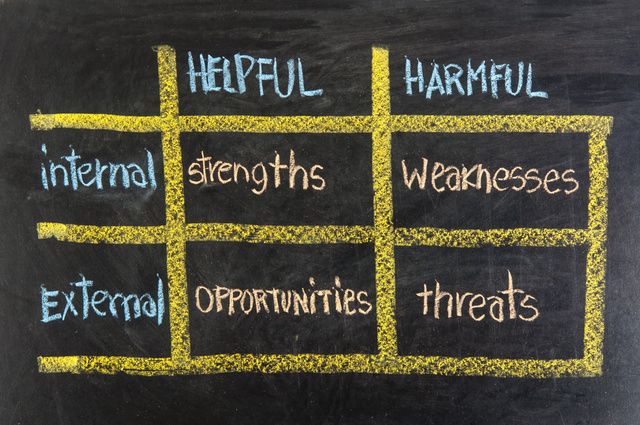Ideas for Strategic Thinking in Marketing
Strategic Analysis
It’s the process of developing strategy for a business by researching the business and the environment in which it operates. A strategic analysis will be referred to as a SWOT analysis: Strengths, Weaknesses, Opportunities, and Threats. Within these four areas, you will define your organization’s position relative to the competition and operational environments. While many believe it is best used at the organizational level, when properly implemented, a SWOT analysis will often return targeted, productive results at division or departmental levels of business. More about this step you can read here.

Scenario planning
The scenario planning technique constitutes a useful and practical way to think about the enterprise as a whole and its interaction with the environment. It refers to the formulation of alternative possible futures for the firm and its environment as a means of exploring the utility of different strategies. The scenario represented a landmark shift in management perspective, from a deterministic view (‘‘we can control our destiny’’) to the view that the future is intrinsically unpredictable (‘‘we need to envision a range of different
possible futures and prepare for them’’). Its pioneering implementation is usually attributed to Herman Kahn’s cold war studies at the RAND Corporation and the Hudson Institute and to Pierre Wack, who was head planner of the Royal Dutch Shell business environment division in the early 1970s.
other variables that reflect the overall progress of the firm towards its long-term objectives.
What’s most important is achieving high performance while balancing the needs of all the stakeholders.
How the UK marketers feel towards the GDPR
Only 11% of marketers already have systems in place to ensure they don’t fall foul of the legislation, as shows data from YouGov and The Chartered Institute of Marketing (CIM). From May 2018, the EU General Data Protection Regulation (GDPR) will come into effect. The reform is one of the most significant in years at 200-pages long and formalizes concepts like the ‘right to be forgotten’, data breach accountability, data portability and more. Huge fines of €20m, or up to 4% of global revenues, have been threatened for non-compliance.
The study into the challenges and opportunities facing those in the industry was based on two separate surveys from YouGov and the CIM. Key findings from the former, which surveyed 225 marketers found that for those in the UK, Brexit (55%) and a recession (47%) were the top concerns for the year ahead. Only 13% of those quizzed said that GDPR would be a significant cause of worry, with just 31% admitting they do not know whether their business has taken steps to ensure they’re compliant.

source: The Chartered Institute of Marketing (CIM)
The CIM’s dataset from 112 members revealed that 70% of marketers are concerned about factors outside of their control, including data breaches, impacting on their brand. The introduction of GDPR will have huge ramifications for marketers who handle personal data and also place demands on businesses to demonstrate informed consent to use consumers’ personal data for marketing purposes – something marketers have previously expressed anxiety over.
Chris Daly, chief executive of the CIM said that while marketers were conscious of impending challenges like Brexit and other digital trends, they have to make sure it doesn’t obscure other issues.
“It is concerning to see that GDPR has not been fully considered, given the wide-reaching impact this will have on business areas which deal with data – marketers’ natural habitat. Given the concerns that emerged from consumers last year over how businesses collect and use customer data, marketers must make sure they are prepared and ready for GDPR sooner rather than later. By staying on the right side of the incoming legislation, marketers are best placed to safeguard not only their business’ reputation, but also its finances.”
The report, “The Challenges and Opportunities facing Marketers in 2017”, features the results of a YouGov survey of 255 marketers, in which more than half (55%) said the UK’s exit from the European Union was among their top concerns.
As a result of the UK’s looming constitutional changes, 54% of marketers said they expected to see an increase in “Brand Britain” messaging, and 19% said they were already looking at how to incorporate this into their own marketing.
Further data from a survey of 112 CIM members, conducted via Survey Monkey, reveals that:
- 70% of marketers are concerned about factors outside of their control (data breach, tax scandals, workers’ rights problems) impacting on the brand
- 95% think marketers need more influence and involvement with the broader business in order to protect brand reputation
Despite the influence social media gives consumers, only 18% of marketers are confident they can handle anything social media throws at them.
One of the key drivers for this is the impact of social media, which gives consumers a platform to shine a light on bad brand behaviour – in fact, 89% of marketers believe the Internet, and social media in particular, gives consumers more power to effect change over brands. However, 21% of marketers feel that while they can manage social media daily, they would struggle in the midst of a Twitter storm. Half of marketers (49%) also say they are not getting the most out of their social media, with 22% attributing this to a lack of investment. While marketers are trying to keep up with changing customer expectations, it would seem some are being held back by the business.
Top 10 Tips for Branding Yourself

source: Working Voices
Living in the era of social media power, when the information is the key and in everybody’s reach, finding oneself’s niche and becoming known is getting a more and more difficult task to accomplish. Even at first glance it seems the reality is exactly the opposite, the rapidity in which one can get into the public’s eye, but at the same time fade away, makes it even harder than before to make it last and create a strategic and smart path for one’s good brand positioning.
We’ve prepared some tips that we hope will help you on your road to success:
- Asses the market you are working on
Knowing the past, the competition and the market you are activating on is key in order to create a good positioning for your brand.
- Look deep within yourself and find your best features
According to Robert Half, branding yourself begins with self-reflection. Take stock of your strengths. What are your best attributes? What positive adjectives might a colleague use to describe you? Is there one particular talent or discipline in which you truly shine? What’s your personality? If you’re just beginning your career, choose a discipline or area of focus that truly interests you. Don’t pretend to be something you’re not. Hard-working, focused and reserved people get ahead just as often as social butterflies.
- Work on developing them even more
Go to extra classes / courses, attend workshops and seminars that will help be become even better on your field of expertize and that will enhance your talents. Learning never ends, no matter the time in your career you are at.
- Of all of them find the differentiator, your USP (unique selling point), that makes you unique
The USP is the big idea that brands are always searching for. A USP gives a brand a compelling and unique value proposition with its target audience. “Likewise, you want to represent something special that sets you apart from others and establishes a value equation about your abilities when you are pitching yourself for a job, a promotion or a free-lance assignment,” says Catherine Kaputa in Huffington Post.
- Define your brand and become an expert
Take the time to do some soul searching and determine exactly who you are and what makes up your brand. Whether you’re looking to garner media attention, attract new clients or build your business, you should focus on becoming an expert in your field. Avoid establishing an expertise that’s irrelevant to your mission, goals, and vision. You’ll just be wasting your time.
- Be present in the market and make yourself known
Make sure you are present at the most important events in your industry and start conversations with the right persons, the ones with whom the association with will help your brand and your career. Ask questions, mingle, try and show your expertize as much as you can.
- Generate brand awareness through networking and promotion
You should be connecting with other professionals in the industry by using social networks and commenting on their blogs. Networking is one of the best ways to become known in the industry. By forming relationships with people in your audience, you can grow your business and your brand long-term.
In time, once you have a known and appreciated voice try using the PR tools available to you and get your name out there.
- Be a constant presence on the social media channels that are representative for your work
Depending on the industry you are activating on make sure you know what social media channel suits you the best. Not every industry fits you having a profile on Linkedin and Facebook at the same time, not every industry requires an Instagram or Snapchat account. Also, make sure that the content you are delivering is customized to that specific social media account.
- Always keep on expending your network, strategic partnerships and focus on the game plan
The networks are meant to evolve, not stand by. So is the industry you are activating on. Moreover, you can never know what the future holds. The more people you know, the merrier. The more connected you are, the better. Make sure that at the same time you don’t lose the focus on your “final” game plan.
- Don’t look focus, get rid of your ego and accept criticism
According to the AICPA specialists, the true measure of your brand is the reputation others hold of you in their hearts and minds. Notice how they introduce you to others. Ask them what your top brand attributes and core strengths are. If they can easily tell you, then you’ve succeeded in branding you.
“These days, branding the company you work for isn’t enough. The world wants to hear what you have to say as a professional within a company. The work involved in uncovering your brand may seem daunting, but your efforts can benefit you immeasurably. Your unique brand message differentiates the best you have to offer, gives a good indication of what you’re like to work with, and shows how you make things happen,” says the American Institute of CPAs.
When it comes to being the best the ego shouldn’t be standing in your way. Accept the criticism, as it will only make you better and help you achieve your goals.



